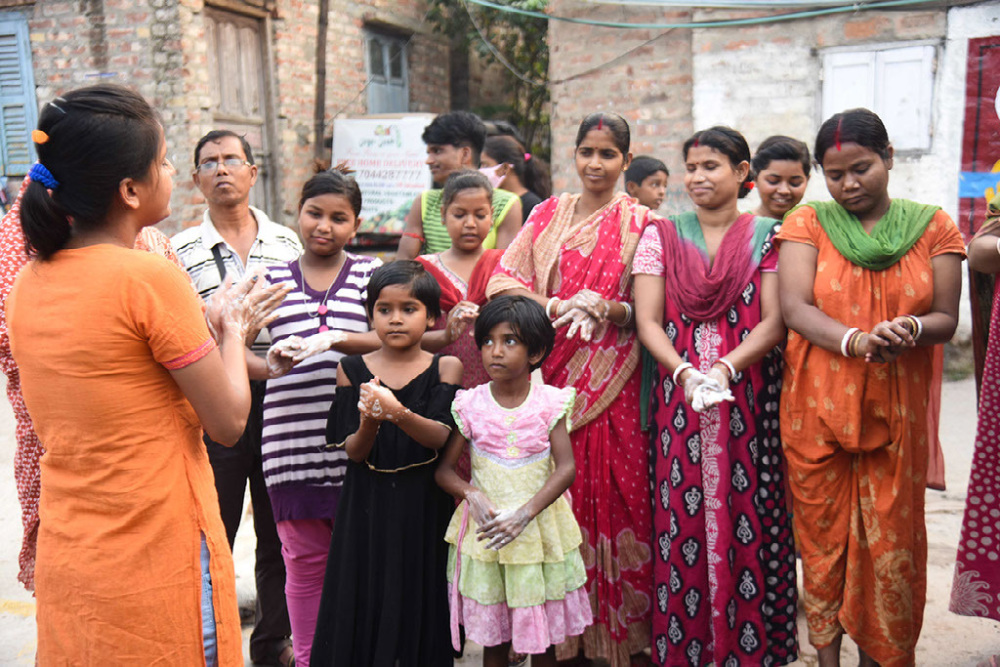
Respostas da comunidade para manter as crianças seguras durante a COVID-19 [artigo especial]
À medida que a pandemia global do coronavírus exacerba as vulnerabilidades de crianças e jovens em todo o mundo, os parceiros locais do Global Fund for Children estão no centro das respostas da comunidade. Por meio de seu Emergency Response Fund, o GFC está emitindo subsídios para organizações de base para ajudar a manter os jovens seguros.
Em março de 2020, quando a pandemia da COVID-19 atingiu o mundo todo, o Global Fund for Children e seus parceiros locais se mobilizaram rapidamente para responder às necessidades dos jovens. Ficou claro que a pandemia teria consequências imediatas e duradouras para crianças e comunidades, desde perda de renda familiar e insegurança alimentar até falta de acesso a cuidados de saúde, escolas fechadas e aumento da violência em casa.
À medida que os países fechavam para combater o vírus, os parceiros locais da GFC entraram em ação para ajudar famílias sem água encanada a receber kits de higiene, meninas em risco de abuso a encontrar abrigo seguro e alunos sem conexões confiáveis de internet a frequentar aulas virtuais. A GFC estabeleceu uma Fundo de Resposta a Emergências emitir subsídios em dinheiro para seus parceiros que atendem crianças afetadas pela pandemia, aprovando $404.000 em subsídios de emergência para 124 parceiros em todo o mundo até o final de setembro de 2020.
Por meio de tudo isso, a GFC também continua a dar suporte a organizações locais, fornecendo financiamento irrestrito, suporte de capacidade e práticas de proteção, à medida que os parceiros mudam do auxílio emergencial para adaptação e resiliência de longo prazo. Juntos, a GFC e as organizações comunitárias estão planejando respostas que ajudarão a proteger e capacitar os jovens durante e após a COVID-19.
Nos próximos seis meses, a GFC está comprometida em distribuir mais de $1,8 milhões em subsídios para organizações comunitárias que respondem à COVID-19. Isso inclui pelo menos $570.000 em subsídios para organizações que atendem crianças e jovens em todo o mundo, bem como £ 1 milhão em subsídios de emergência para negros, asiáticos e minorias étnicas (BAME).*) comunidades na Inglaterra através da Fundo Phoenix.
Neste relatório, saiba mais sobre os impactos de longo alcance da COVID-19 em crianças e comunidades, como as organizações locais estão posicionadas para responder durante uma crise e o compromisso da GFC com a flexibilidade e a capacidade de resposta durante e após a pandemia.
Clique nos links abaixo para pular para diferentes tópicos dentro do relatório:
- Contexto: saiba mais sobre as formas como a COVID-19 está afetando crianças e comunidades em todo o mundo
- Respostas baseadas na comunidade: veja como as organizações que atendem crianças e jovens estão respondendo à pandemia
- Nosso papel: descubra como a GFC está apoiando essas organizações locais em suas respostas à pandemia
- Olhando para o futuro: veja o que vem a seguir nos planos da GFC para apoiar a resiliência das bases durante a COVID-19 e além
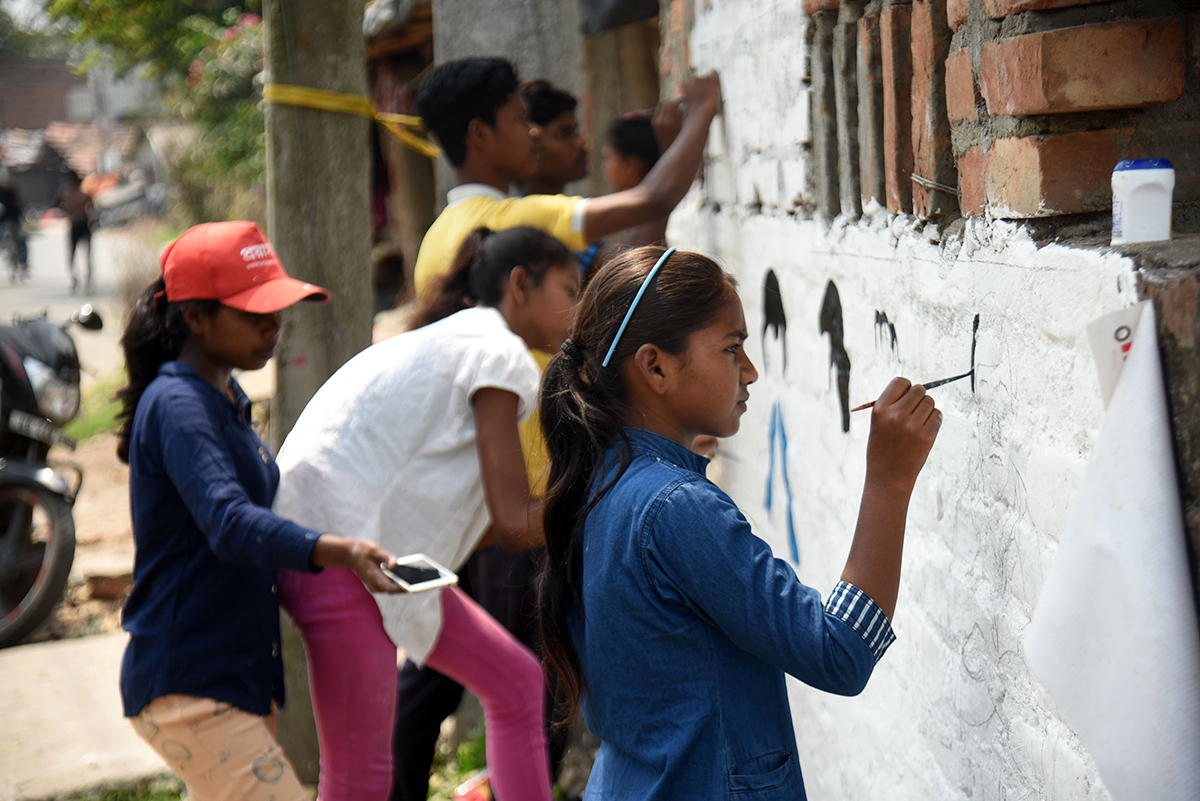
Contexto
A pandemia da COVID-19 mudou significativamente o mundo como o conhecemos. Os jovens – e as organizações de base que os apoiam – estão enfrentando uma miríade de efeitos imediatos e de longo prazo.
Impacto nas crianças e famílias
O encerramento de escolas causado pela COVID-19 continua a afetar mais de metade da população estudantil mundial, com 579 milhões de estudantes fora da escola.
Uma pesquisa de impacto realizada pela Magic Bus, parceira da GFC na Índia, demonstra os efeitos colaterais do bloqueio na educação e nos meios de subsistência: 83% de adolescentes relataram que não conseguiam acessar nenhum recurso de aprendizagem online, o que excluiu um grupo considerável de alunos das oportunidades educacionais – e afetou suas perspectivas futuras de emprego.
Além dos impactos na educação, os parceiros da GFC estão a assistir a um aumento do casamento infantil, tráfico de crianças, e violência contra crianças. Os parceiros estão preocupados em perder terreno durante esta crise, já que as medidas de distanciamento social e a perda de renda familiar agravam os problemas que eles trabalham tanto para resolver.
UM Pesquisa em 46 países de crianças e cuidadores, divulgado em setembro, descobriu que 77% das famílias perderam renda devido à COVID-19, e 96% estão lutando para pagar pelas necessidades essenciais de seus filhos, incluindo alimentos e suprimentos médicos.
As conclusões do Centro Integral de Atención a las Mujeres (CIAM), parceiro do GFC, no México, ecoam estes resultados globais: 80% de participantes do programa CIAM relataram que sua situação econômica piorou durante a pandemia, enquanto 66% relataram dificuldades para adquirir alimentos básicos e produtos de limpeza.
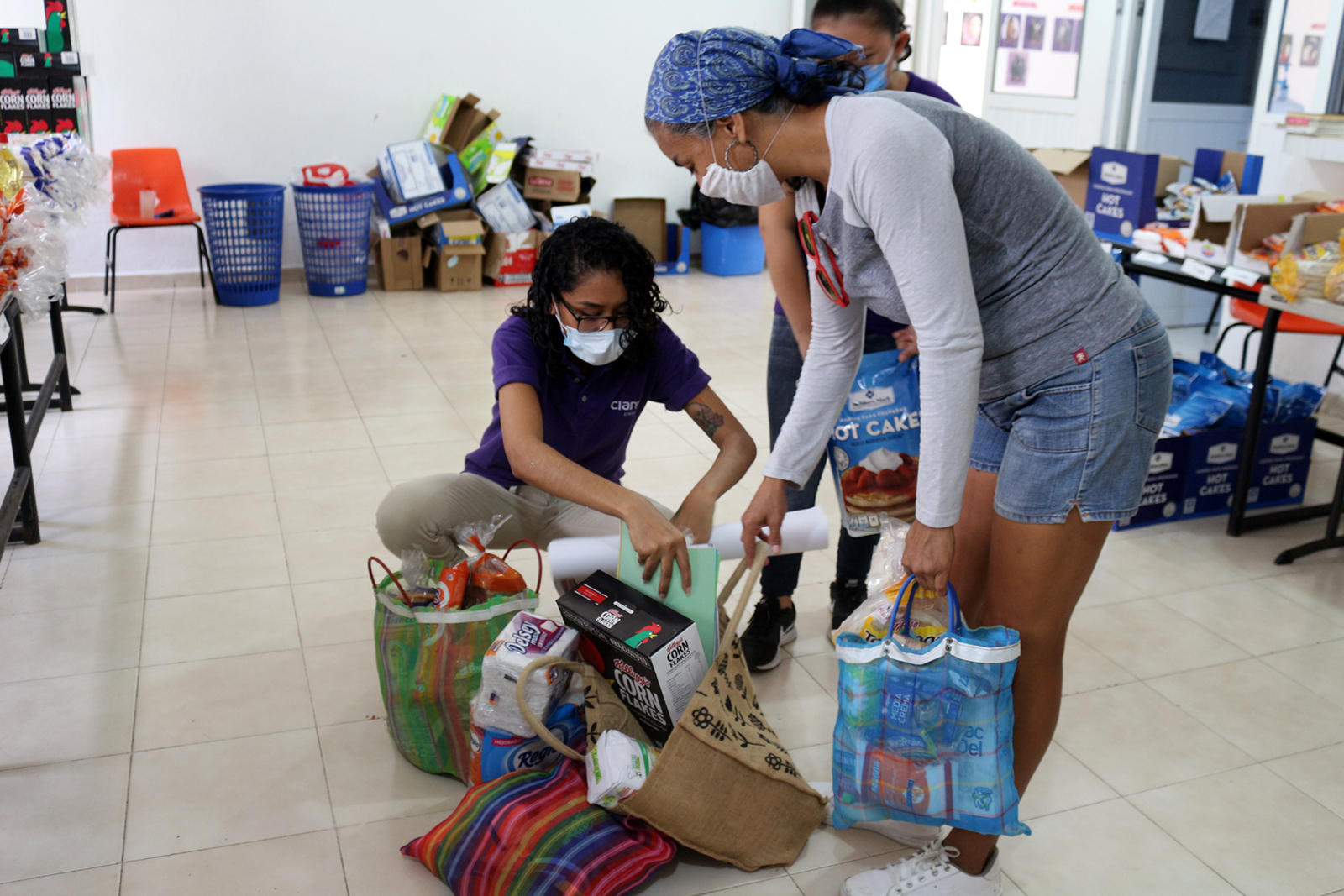
Impacto nas organizações locais
Organizações de base ao redor do mundo servem como uma fonte crítica de apoio para crianças e famílias todos os dias. Agora, quando seu apoio é ainda mais necessário, essas organizações também estão enfrentando novos desafios causados pela pandemia.
As organizações locais tiveram que fazer mudanças significativas em sua programação – fechando atividades de grupo, fechando empresas sociais geradoras de receita e cancelando a arrecadação de fundos presencial. Essas ações necessárias ameaçam a própria existência das organizações. No Reino Unido, por exemplo, a COVID-19 colocou nove em cada dez micro e pequenas organizações BAME correm risco de fechar em três meses.
Em uma pesquisa global de parceiros da GFC sobre os impactos da COVID-19, 60% relatou uma “interrupção significativa” nos serviços, e 65% relatou que havia mudado parcial ou totalmente para serviços ou programação virtuais.
No final de agosto, os governos e as organizações de desenvolvimento comprometeram-se a financiar aproximadamente $20,3 trilhões na resposta à COVID-19. No entanto, menos de 1% desse financiamento é destinado a organizações não governamentais e organizações da sociedade civil em todo o mundo.
Os parceiros do GFC estão enfrentando a tarefa de encontrar um equilíbrio entre fornecer ajuda emergencial e continuar a avançar com sua programação regular o máximo possível. Eles estão fazendo o melhor que podem para enfrentar desafios crescentes, exibindo adaptação e resiliência incríveis, mesmo com as fontes de financiamento se tornando mais escassas.
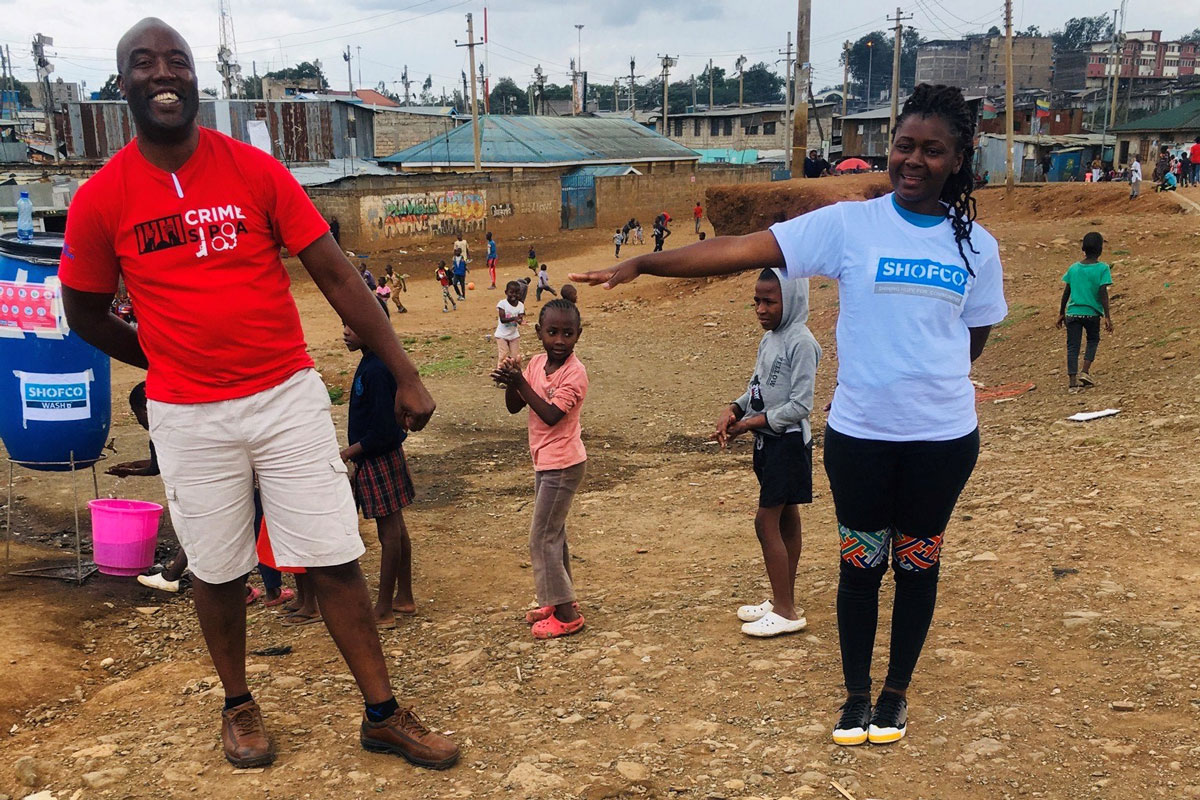
Respostas baseadas na comunidade
Os parceiros comunitários da GFC estão em uma posição única para proteger crianças e jovens durante uma crise. Muitas vezes, única fonte confiável de suporte em suas comunidades, líderes de base assumiram o papel de socorristas e coordenadores de emergência, preenchendo lacunas onde a resposta do governo falhou. Organizações de base estão fazendo o trabalho no local para manter as crianças seguras e protegidas nas circunstâncias mais difíceis, mudando de marcha para lidar com novos desafios e necessidades futuras.
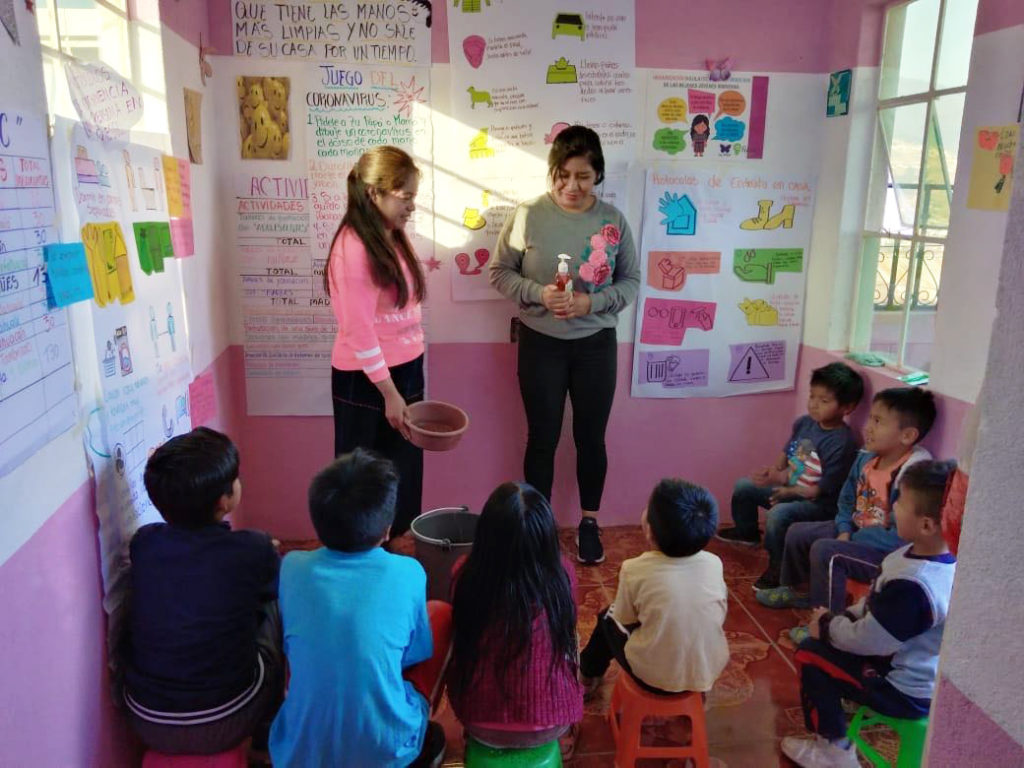
Os parceiros da GFC em todo o mundo responderam rapidamente à COVID-19:
- Montagem de kits de emergência – incluindo alimentos, medicamentos e desinfetante para as mãos – para centenas de crianças, jovens e famílias
- Mobilizar campanhas de educação comunitária, incluindo estações móveis de lavagem de mãos, teatro de rua e murais
- Servindo como fontes confiáveis de informações sobre a prevenção e o tratamento da COVID-19, dissipando mitos e rumores por meio de campanhas de divulgação na comunidade e nas mídias sociais
- Fornecer pessoal para linhas diretas de denúncia de abuso infantil, monitorar o tráfico de crianças e fornecer moradia alternativa para crianças que vivem em abrigos
- Transição de programação on-line, incluindo serviços de aconselhamento
- Sensibilizar e defender as comunidades que estão a ser deixadas para trás na crise
À medida que a pandemia avança, nossos parceiros locais continuam esse trabalho e se adaptam a novas realidades – implantando tecnologia para alcançar crianças e jovens, ajustando atividades de empreendedorismo social e encontrando novas maneiras de manter suas equipes produtivas e motivadas. Em todo o mundo, os parceiros compartilharam histórias de suas respostas, seus desafios e sua determinação em meio à pandemia do coronavírus. A Zy Movement Foundation na Tailândia e a Coincidir na Guatemala são dois exemplos.
Fundação Movimento Zy
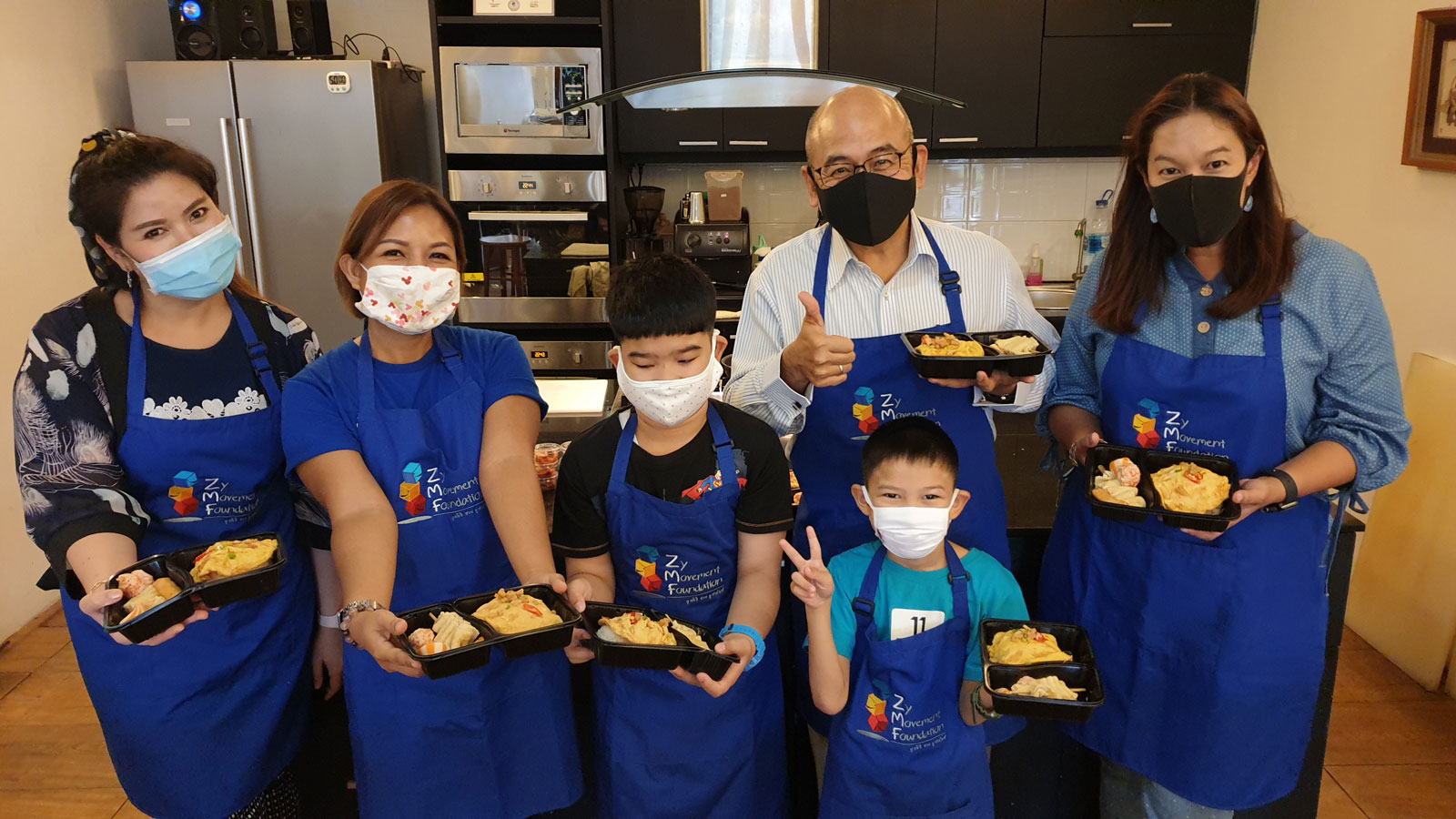
Na Tailândia, Fundação Movimento Zy (ZMF) trabalha com escolas, universidades, hospitais, pais e partes interessadas do governo para garantir que crianças com deficiência tenham acesso à educação inclusiva, para fornecer soluções tecnológicas de ponta para crianças com deficiências físicas e para mudar a mentalidade social sobre as habilidades dessas crianças. A organização foi fundada por Walter Lee e recebeu o nome de seu filho, Zy, que nasceu com metade do braço direito, sem perna direita, uma perna esquerda malformada e articulações do quadril deslocadas. Zy, agora com 14 anos, é um colíder ativo nos programas e atividades da ZMF, incorporando a filosofia da organização de posicionar crianças com deficiência como líderes e tomadores de decisão em questões que as afetam.
Quando a Tailândia iniciou medidas de bloqueio para garantir o distanciamento social, a equipe da ZMF começou a trabalhar remotamente e suspendeu todas as atividades presenciais. A organização mudou seu foco para fornecer pacotes de ajuda para famílias de crianças com deficiência. À medida que a pandemia começou a impactar negativamente os meios de subsistência dos membros da comunidade da ZMF, a equipe adaptou sua programação para incluir um programa de desenvolvimento de habilidades chamado Train the ZMF Entrepreneur. Para este programa, Walter está usando seu restaurante existente para ensinar habilidades culinárias e está orientando os negócios incipientes que resultam. A ZMF usou sua doação emergencial da GFC para adquirir máscaras e kits de higiene para funcionários e membros da comunidade, bem como suprimentos de alimentos para os membros da comunidade mais afetados pelo fechamento e perda de meios de subsistência.
À medida que a ZMF olha para o “novo normal”, ela planeja continuar o programa de empreendedorismo recentemente fundado para fornecer treinamento de subsistência para jovens com deficiências e suas famílias. A organização também fornecerá mais suporte online para pais de crianças com deficiências e oferecerá seminários médicos online para envolver a comunidade de saúde mais ampla.
Coincidir
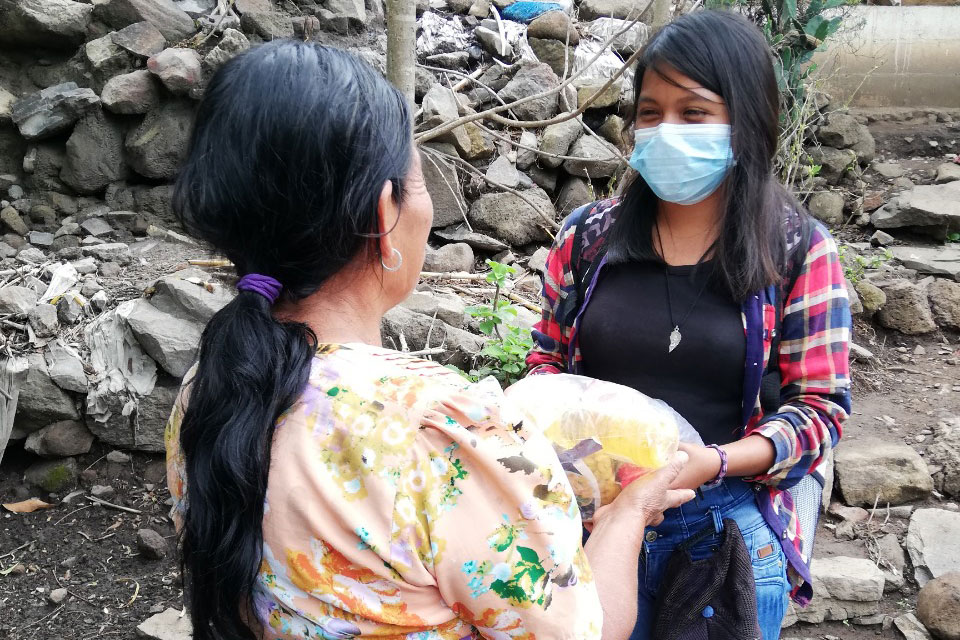
Na Guatemala, a Coincidir defende os direitos dos jovens reunindo meninas em comunidades rurais afetadas pela violência social para se envolverem em advocacy liderada por jovens. Com o apoio da Coincidir, meninas adolescentes têm candidatos a prefeito convictos adotar políticas centradas nas meninas e ter música hip-hop usada para mudar normas sociais. Na região de Jalapa, um grupo de 20 meninas defende seus direitos e as necessidades de suas comunidades por meio de uma rede que elas chamam de La Coordinadora.
Quando o coronavírus atingiu a Guatemala, as comunidades em Jalapa foram algumas das mais atingidas. A maioria das pessoas são diaristas e perderam seus empregos durante o bloqueio, e a região já havia sofrido desnutrição grave antes mesmo da pandemia. Percebendo que poderiam ajudar, as meninas de La Coordinadora começaram a distribuir máscaras, desinfetante para as mãos, sabão e produtos alimentícios para crianças e famílias. A Coincidir é uma das poucas organizações que vão de porta em porta, fornecendo ajuda e aconselhamento a mais de 250 famílias.
Mas as líderes femininas da Coincidir fazem mais do que fornecer os suprimentos necessários: eles também oferecem às famílias a oportunidade de se envolver. Quando distribuem os suprimentos, as meninas de La Coordinadora perguntam às famílias, não importa quão humilde seja seu status, "Vocês contribuirão com algo para a comunidade?" Essa pergunta simples reforça a dignidade de cada família, e normalmente as famílias doam algo de seus jardins para ser compartilhado com outras pessoas. O objetivo delas? Fornecer assistência humanitária que fortaleça as comunidades e respeite sua dignidade.
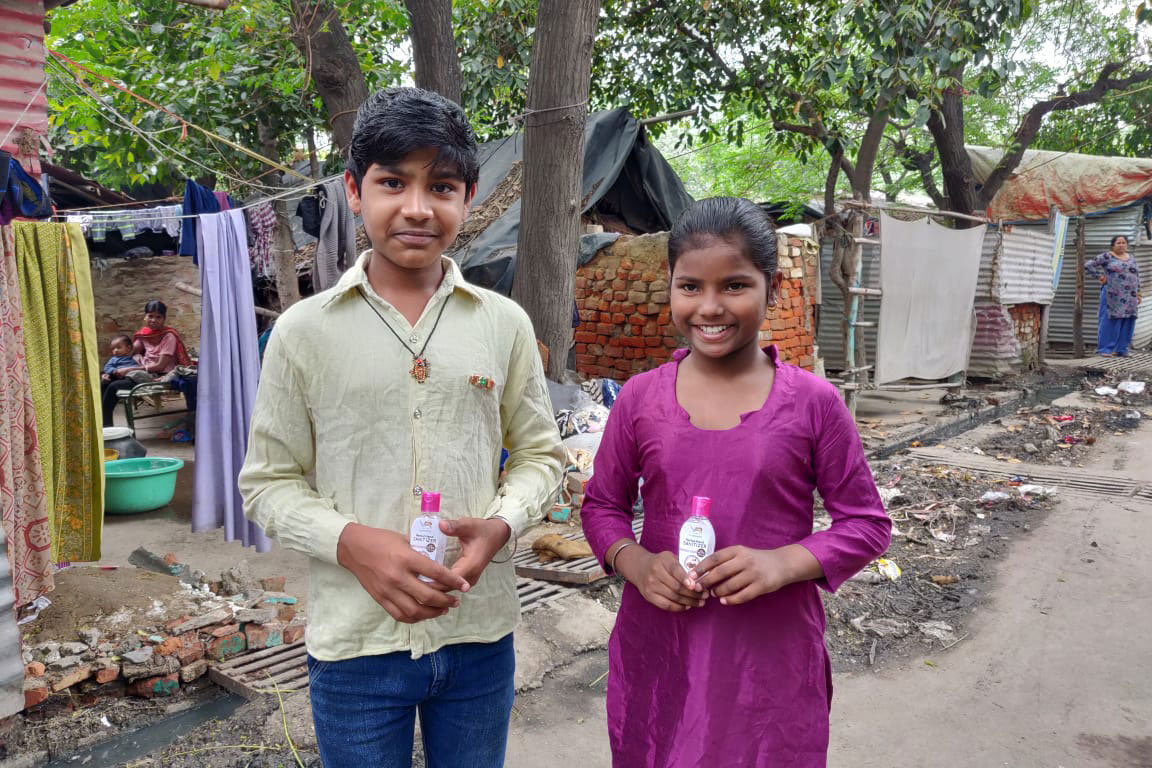
Nosso papel
O Global Fund for Children defende vozes, soluções e ações coletivas para crianças no nível comunitário. Mais do que nunca na crise atual, as organizações locais têm um papel crítico a desempenhar, com relacionamentos únicos e acesso a jovens em algumas das circunstâncias mais vulneráveis.
Os parceiros comunitários da GFC abordam lacunas e desigualdades sociais, que a pandemia da COVID-19 ampliou. Garantir que essas organizações possam continuar a operar, adaptando-se conforme necessário, e possam manter o curso para efetuar mudanças sistêmicas de longo prazo é essencial para a vida de crianças e jovens e para suas comunidades.
A expertise da GFC com doações globais tornou possível distribuir rapidamente fundos – e suporte não financeiro – para ajudar essas organizações locais a manterem seu trabalho de salvar vidas. Para muitos parceiros, a GFC foi a primeira financiadora a oferecer suporte neste momento de grande incerteza. A GFC continua a apoiar essas organizações enquanto elas se reconstroem e trabalham para fornecer programação essencial para jovens de novas maneiras.
Financiamento flexível
Em março de 2020, a GFC enviou seu primeira bolsa de emergência COVID-19 para Ashanti Peru, fornecendo fundos para comprar desinfetante para as mãos e sabão para 300 famílias em Lima que só têm acesso a água encanada por algumas horas por dia.
“Pensamos em quem nos entenderia e responderia rapidamente: o Global Fund for Children imediatamente veio à mente. Acho que tivemos os fundos adicionais em dois a três dias”, disse Marco Antonio Ramirez, presidente da Ashanti Peru.
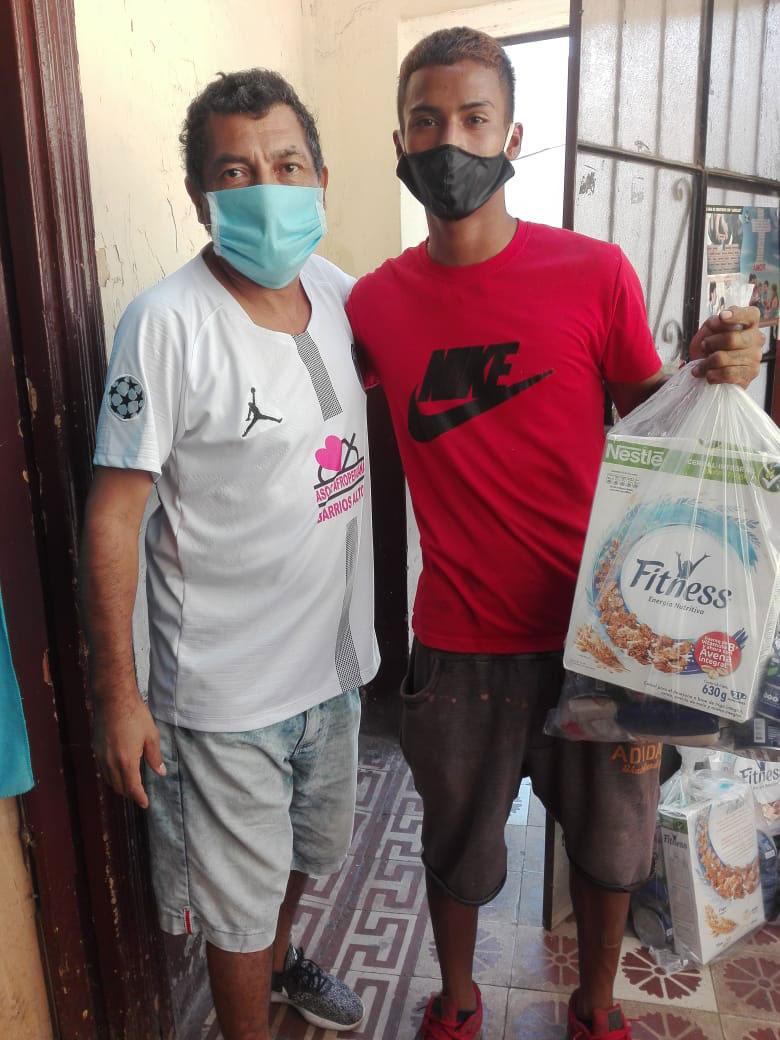
Até ao final de Setembro de 2020, a GFC tinha aprovado 153 subsídios de emergência num total de $404.000 através do seu Fundo de Resposta a Emergências, apoiando 124 parceiros locais em 35 países.
Na Moldávia, Instituto de Iniciativas Rurais usou sua doação de emergência para dar assistência alimentar de emergência a crianças em vilas rurais que enfrentam escassez induzida pela pandemia. Na Índia, Avani forneceu comida e abrigo seguro para mulheres e crianças migrantes que não puderam retornar para suas aldeias natais quando o país entrou em lockdown. E na África do Sul, Jujubas forneceu serviços virtuais para crianças em risco de violência e abuso.
Em uma pesquisa com beneficiários de subsídios emergenciais, 96% dessas organizações comunitárias relataram que foi fácil ou muito fácil receber um subsídio emergencial para a COVID-19 da GFC.
Entrevistados anônimos destacaram a urgência e o impacto dessas bolsas para crianças e jovens em suas comunidades:
“A situação dos nossos jovens era terrível. A ajuda de vocês fez uma grande diferença, e a facilidade e rapidez da aplicação e transferência nos permitiram aliviar muitas dificuldades prontamente.”
“Sua doação era urgente e profundamente apreciada. Com outros, você nos permitiu alimentar mais de 2.000 crianças por dia em suas daaras onde elas vivem, já que sua fonte normal de alimento – mendicância – foi completamente cortada.”
GFC tem juntou-se a mais de 700 financiadores ao pedir que a filantropia abrace mais amplamente os princípios de financiamento flexível, suporte e confiança durante e além da crise do coronavírus. A promessa incorpora os princípios essenciais da filantropia baseada em confiança com os quais a GFC está comprometida.
O GFC também fez parceria com o The National Lottery Community Fund e organizações lideradas pelo BAME em toda a Inglaterra para colocar a justiça racial no centro da resposta à pandemia da COVID-19. Por meio do Fundo PhoenixA GFC está apoiando uma rede de instituições de caridade BAME na Inglaterra que estão trabalhando no coração de suas comunidades.
Suporte além do cheque
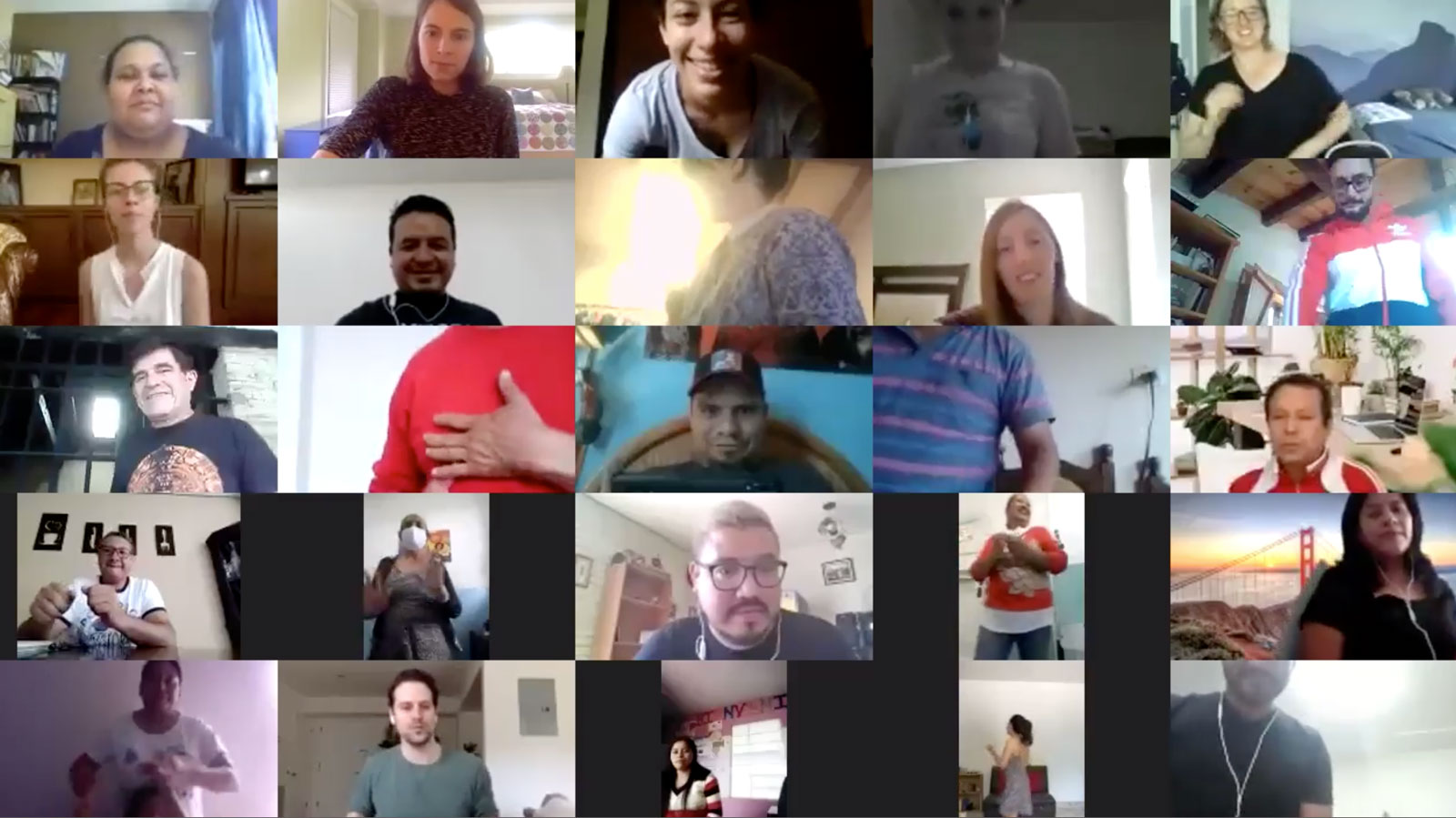
Além de conceder subsídios, a GFC está compartilhando as melhores práticas que ajudam as organizações a se adaptarem; facilitando apresentações a outros financiadores dos quais os parceiros podem solicitar fundos de emergência; e convocando parceiros virtualmente para permitir que expressem suas preocupações, aprendam com as respostas dos outros à COVID-19 e criem solidariedade. A GFC está comprometida em ouvir seus parceiros locais para melhor atender às suas necessidades de desenvolvimento de capacidade e está criando ciclos de feedback para continuar fornecendo suporte responsivo e relevante. Exemplos do suporte da GFC além do cheque incluem:
Treinamentos contextualizados: Respondendo a solicitações de parceiros, a GFC investiu em treinamento de qualidade para parceiros sobre a utilização de recursos online para realizar workshops e reuniões eficazes. Em agosto, os parceiros regionais das Américas participaram de três treinamentos em espanhol liderados pela Training for Change sobre facilitação dinâmica online.
Indicações de financiamento: A GFC continua a oferecer suporte contextualizado e compartilhar recursos com parceiros, incluindo links para suporte financeiro de emergência, identificando fontes de financiamento elegíveis e servindo como um referenciador recomendado. A GFC recentemente se tornou um parceiro de referência do Global Resilience Fund para dar suporte a organizações comunitárias lideradas por meninas, mulheres jovens e/ou jovens trans e intersexuais, o que permite que parceiros elegíveis da GFC acessem este novo fundo.
Diálogos de liderança: Em março de 2020, a GFC lançou um CEO Circle virtual, liderado pelo presidente e CEO John Hecklinger, com 12 líderes organizacionais e fundadores de organizações parceiras em todo o mundo. Essas chamadas servem como uma plataforma para compartilhar experiências e lições aprendidas sobre liderança durante uma crise e fomentaram um senso de solidariedade regional e global.
Conferências online: As muitas conferências presenciais que passaram para um formato virtual forneceram uma oportunidade para a GFC facilitar a visibilidade de seus parceiros e suas causas. No Fórum de Doadores da América Central em setembro, a GFC moderou um painel com quatro de seus parceiros sobre abordando as desigualdades na filantropia para mudar o poder.
Chamadas de parceiros regionais: O GFC facilitou chamadas de parceiros regionais, aproximadamente mensais, para continuar a expandir as conexões e fornecer um espaço para refletir e compartilhar experiências com colegas. Essas chamadas são altamente frequentadas, com mais de 50 pessoas a cada mês, e contribuíram para aumentando a felicidade e solidariedade.
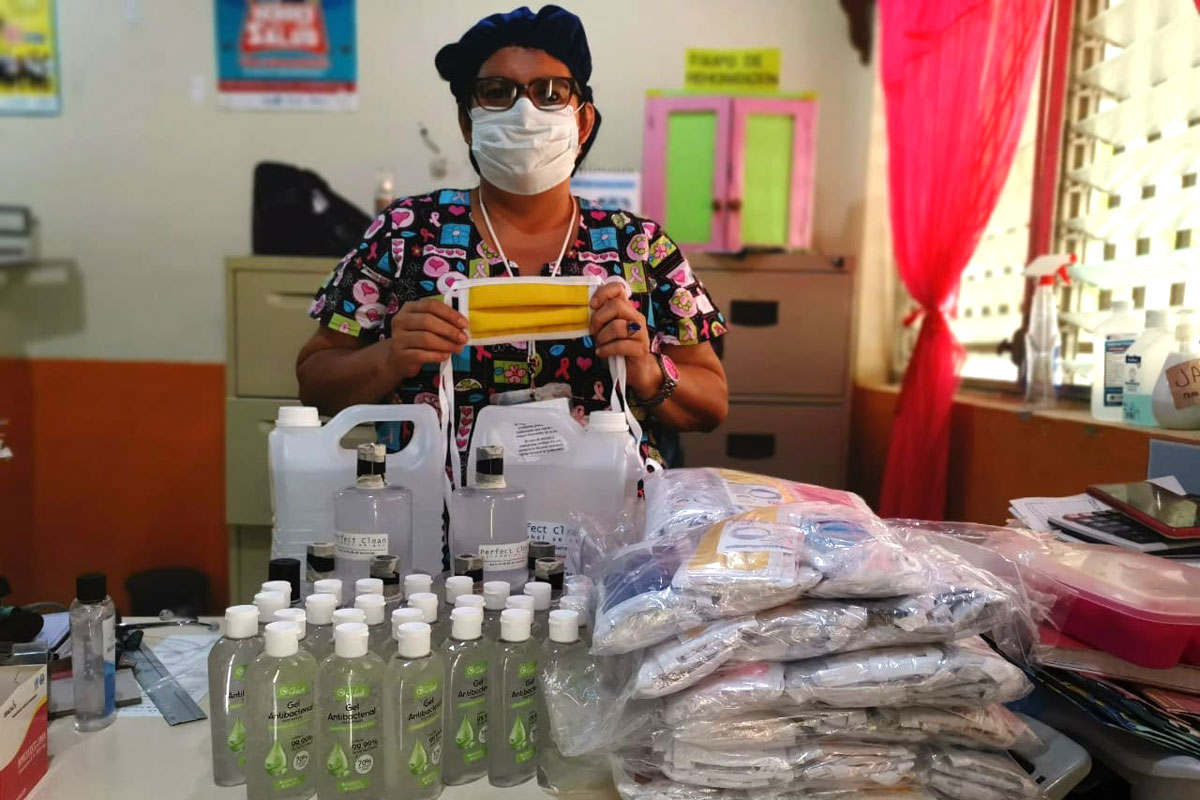
Olhando para o futuro
Embora o futuro permaneça incerto, a GFC continuará seus esforços de resposta e recuperação para aliviar o impacto da COVID-19 em crianças e jovens. A GFC está comprometida em se adaptar e mobilizar por trás de seus parceiros locais. A resposta da GFC permanecerá enraizado em financiamento flexível que permita aos seus parceiros determinar a melhor utilização dos recursos; solidariedade com abordagens de base; e um compromisso com salvaguardar os jovens que agora correm maior risco de exploração e danos.
Por meio de uma doação de $250.000 do Centro de Filantropia para Desastres, a GFC emitirá fundos de emergência irrestritos para 15 a 20 organizações comunitárias nos próximos seis meses. Isso dará aos nossos parceiros locais recursos imediatos e flexíveis para atender às necessidades urgentes e contínuas de jovens e membros da comunidade. A GFC também continuará a apoiar o Phoenix Fund, usando uma abordagem participativa e liderada pela comunidade para fornecer £ 1 milhão em subsídios de emergência para organizações BAME em toda a Inglaterra.
Em abril de 2020, no início da pandemia, a GFC se propôs a levantar pelo menos $500.000 para resposta de emergência e recuperação da COVID-19 durante esta crise. Graças ao Center for Disaster Philanthropy, à Dorothea Haus Ross Foundation, Linguini, e mais de 80 doadores individuais, superamos essa meta em agosto – mas o trabalho não acabou.
As organizações de base precisam de suporte contínuo não apenas para atender às necessidades imediatas, mas também para planejar o longo prazo. Diante dos desafios contínuos, os parceiros locais da GFC estão trabalhando para trazer de volta serviços confiáveis para crianças em suas comunidades, adotar inovação e soluções online para se adequar a novos contextos e reconstruir sistemas mais resilientes durante e além da pandemia.
Esta é uma oportunidade para a GFC trabalhar com seus parceiros para co-criar e reimaginar um futuro novo, mais equitativo, centrado no ser humano e colaborativo. Podemos usar este momento para melhor apoiar organizações locais a longo prazo, à medida que promovem os direitos das crianças e constroem sociedades mais justas.
Foto do cabeçalho: Em Calcutá, Índia, antes do bloqueio da pandemia, líderes jovens do parceiro de ex-alunos do GFC, Prayasam, conduziram workshops de lavagem de mãos em toda a comunidade. © Prayasam
* Reconhecemos a diversidade de identidades individuais e experiências vividas, e reconhecemos que BAME é um termo imperfeito que não captura totalmente as identidades raciais, culturais e étnicas que vivenciam desigualdade estrutural e sistemática. Sempre que possível, tentamos nomear os indivíduos como eles próprios preferem ser nomeados.